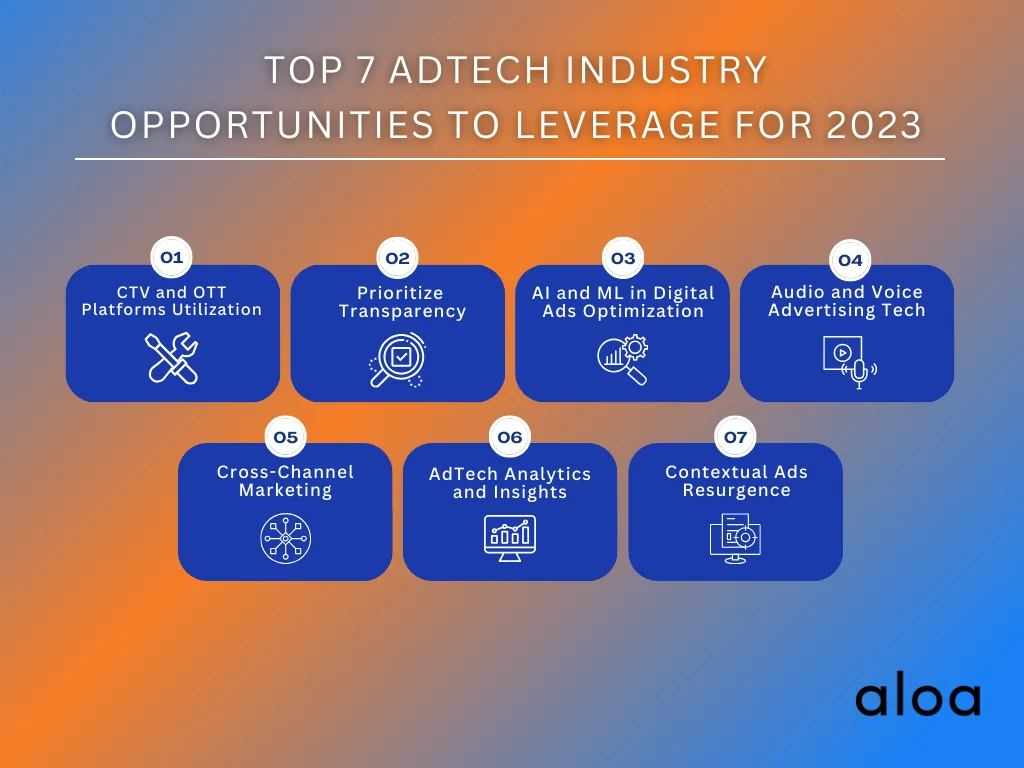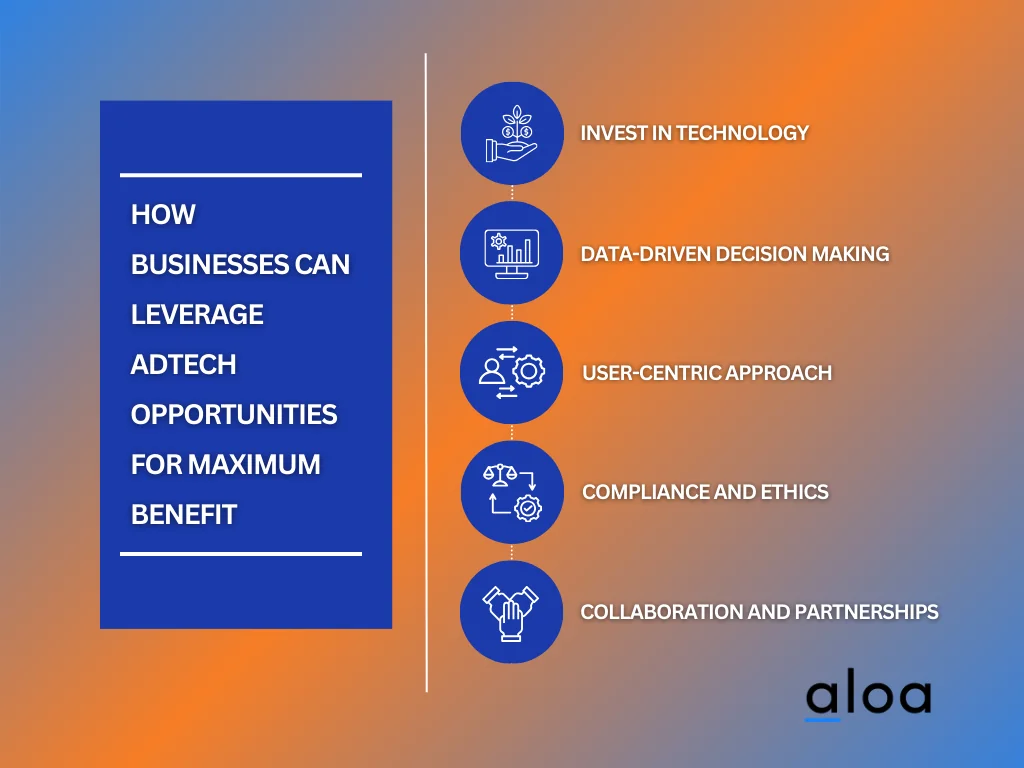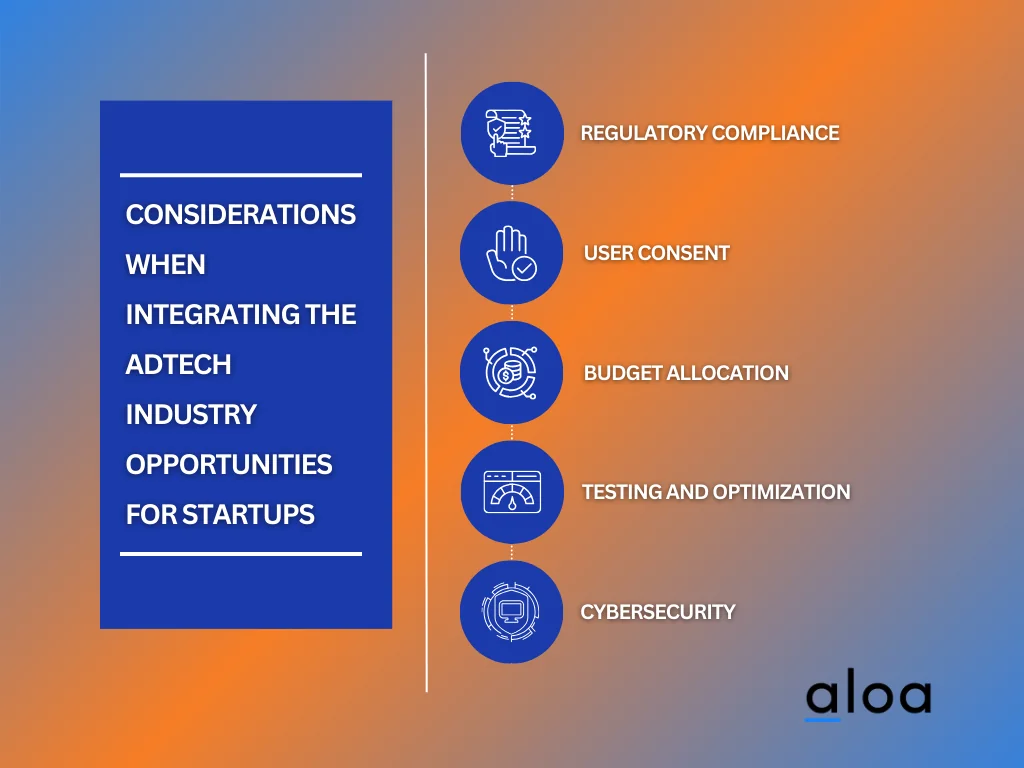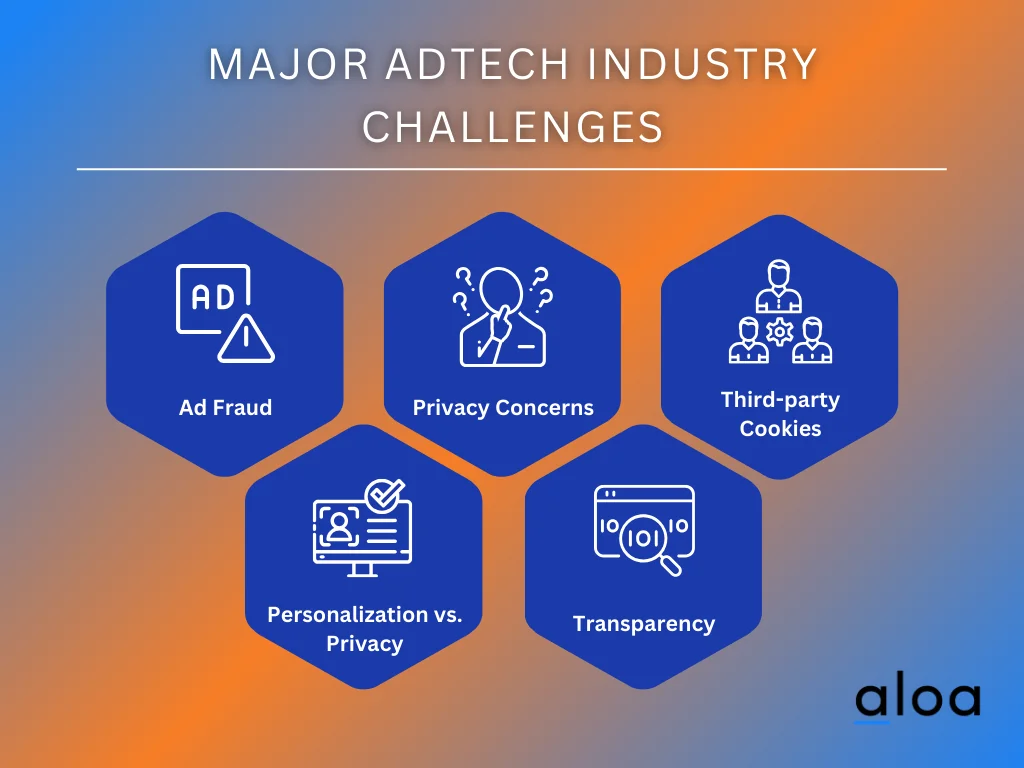The AdTech industry is experiencing a rapid evolution, bringing challenges and opportunities for businesses and startups. To thrive in this ever-changing landscape, a firm grasp on emerging technologies in AdTech becomes paramount. Advertisers encounter various hurdles, including ad fraud, privacy concerns, and the imminent obsolescence of third-party cookies.
Aloa specializes in assisting businesses and startups as they navigate through these challenges. With their extensive expertise in advertising technology, Aloa provides solutions to optimize ad campaigns by leveraging programmatic advertising, real-time bidding, and demand-side platforms. They aim to reach the right target audience efficiently.
This blog examines the top AdTech opportunities for 2024. By the end of this read, you'll gain a comprehensive understanding of how businesses can effectively utilize these opportunities for maximum benefit. It guarantees a cost-effective marketing strategy that yields a high return on investment (ROI) in today's dynamic advertising technology landscape. Stay ahead of the competition and discover the untapped potential of AdTech in 2024.
Let's jump in!
Top 7 AdTech Industry Opportunities To Leverage For 2024
In 2024, it becomes crucial to identify and capitalize on the top opportunities within the AdTech industry that will fuel success. This comprehensive guide explores seven key areas where startups and businesses can harness these opportunities, empowering them to thrive in the dynamic world of advertising technology.

1. CTV and OTT Platforms Utilization
Connected TV (CTV) and Over-The-Top (OTT) platforms have become integral to modern entertainment consumption. CTVs are internet-connected television sets that allow users to stream content through dedicated apps or services. OTT, on the other hand, refers to streaming content directly over the internet, bypassing traditional cable or satellite providers. These platforms have gained prominence due to several key factors:
- Convenience: Users can access content conveniently, negating the need to adhere to traditional TV schedules.
- Personalization: CTV and OTT platforms often collect user data, enabling advertisers to target specific demographics and interests.
- Ad Engagement: With CTV and OTT, ads can be more interactive and tailored to user preferences, resulting in higher engagement rates.
Advertisers can maximize their reach by securing ad space on popular CTV and OTT platforms. Moreover, they can utilize programmatic advertising, which employs AI algorithms to automate media buying. This ensures cost-effective ad placements that effectively target the desired audience. By employing such precision, advertisers can enhance ad relevance and significantly boost conversion rates.
2. Emphasis on Transparency-oriented Solutions
Transparency plays a crucial role in the AdTech industry. In today's era, where data privacy and ad fraud are major concerns, all stakeholders, including advertisers, publishers, and consumers, demand improved transparency regarding ad placements, pricing, and data handling. Innovative opportunity solutions have emerged to address these concerns effectively, with blockchain technology leading the way.
Blockchain's decentralized and immutable ledger provides a transparent and secure platform for recording ad transactions. Advertisers can effectively monitor the entire lifecycle of an ad, from creation to delivery. This transparency significantly reduces ad fraud while ensuring ads are placed in brand-safe environments. Businesses can effectively leverage transparency-driven solutions by exploring blockchain-based advertising platforms and educating their teams and partners on the benefits of transparency. This approach helps build trust and promotes collaboration among stakeholders.
3. AI and ML in Digital Ads Optimization
AI and ML revolutionize digital advertising by empowering advertisers to analyze vast amounts of data in real-time. This enables them to make data-driven decisions for optimizing ad campaigns. Here's how to leverage this opportunity:
- Algorithmic Advertising: AI algorithms automate media buying, ensuring ads are placed cost-effectively and reach the right audience.
- Personalization: AI-powered recommendation engines deliver personalized ads, enhancing the user experience and increasing engagement.
- Performance Metrics: AI allows real-time tracking and analysis of ad campaign performance, allowing immediate adjustments to maximize ROI.
For example, AI algorithms can predict user behavior, enabling ads to be delivered at the right time and to the right audience. This precision enhances ad relevance and, subsequently, conversion rates. By harnessing AI and ML, businesses can stay competitive in the AdTech industry and ensure their ad campaigns are highly efficient and effective.
4. Audio and Voice Technology in Advertising
The rise of smart speakers, voice search, and podcasting has created fresh avenues for advertisers to connect with their audience through audio and voice technology. These advances have seamlessly integrated into people's daily lives, enabling brands to engage users through natural language interactions. Here's how businesses can tap into this opportunity:
- Voice Search Optimization: Optimize content to ensure products or services are discoverable through voice search.
- Podcast Advertising: Partnering with popular podcasts provides access to a highly engaged and loyal audience.
- Voice Assistants: Developing voice-activated ads for platforms like Amazon's Alexa and Google Assistant enhances user engagement and brand visibility.
Voice technology provides brands with a distinct means of establishing a more personal and direct relationship with their audience. Employing creative and captivating advertising experiences enables connections that deeply resonate with users.
5. Cross-Channel Marketing
Cross-channel marketing involves integrating AdTech across various platforms and touchpoints. The goal is to create a unified brand experience that recognizes consumers' engagement through multiple channels, such as social media, email, search engines, and more. Here's how businesses can leverage cross-channel marketing:
- Unified Customer Data: Implement Customer Data Platforms (CDPs) to centralize customer data and gain a holistic view of your audience.
- Personalized Messaging: Use data insights to deliver consistent and personalized messages across all channels, enhancing user engagement and brand loyalty.
- Automation: Marketing automation tools streamline cross-channel campaigns, ensuring a consistent user experience and efficient use of resources.
Cross-channel marketing ensures that users receive a coherent brand message regardless of the platform they engage with. This strategy effectively increases brand awareness, engagement, and conversion rates.
6. AdTech Analytics and Insights
Data forms the crucial foundation of AdTech. Businesses can make well-informed decisions and optimize their advertising campaigns by harnessing analytics and gaining valuable insights. Let's explore how leveraging AdTech analytics and insights can benefit enterprises:
- Advanced Analytics Tools: Investing in advanced analytics tools that offer real-time metrics and provide actionable insights can significantly enhance your decision-making process.
- A/B Testing: Conduct A/B tests to refine ad creatives, messaging, and targeting based on performance data.
- Audience Segmentation: Segment your audience based on behavior and preferences to deliver hyper-targeted ads.
By utilizing analytics and insights, businesses can enhance their advertising campaigns, optimize expenditures, and ensure precise targeting to maximize the return on investment.
7. Contextual Advertising Resurgence
Contextual advertising, where ads are placed in relevant content based on keywords and user behavior, is experiencing a resurgence. With the demise of third-party cookies and increasing privacy concerns, contextual targeting has regained popularity. Here's how businesses can leverage contextual advertising:
- Keyword Optimization: Optimize ad content based on keywords relevant to the surrounding content.
- User Intent Analysis: Use AI to understand user intent and serve ads that align with their interests.
- Content Partnerships: Collaborate with publishers and content creators to place ads in contextually relevant environments.
How Businesses Can Leverage AdTech Opportunities for Maximum Benefit
To stay ahead of technological advances, companies must adopt proactive strategies. Let’s explore five fundamental approaches that empower businesses to effectively leverage the dynamic AdTech landscape for maximum benefit.

Invest in Technology
Investing in innovative technology is a crucial step in maximizing AdTech opportunities. Staying technologically ahead in the AdTech industry grants a significant competitive advantage. This involves leveraging Connected TV (CTV) advertising, integrating Artificial intelligence (AI) for personalized experiences, and adopting blockchain for transparency. Allocating resources to embrace these tools and platforms is paramount for success.
CTV advertising is becoming increasingly popular, giving businesses a valuable opportunity to explore. Companies can reach a growing audience by investing in CTV technology and creating captivating ad campaigns. Additionally, leveraging AI-driven personalization can enhance user engagement by delivering tailored content and recommendations, ultimately leading to improved conversion rates.
Data-Driven Decision Making
In the AdTech industry, data holds immense value, comparable to gold. Data analysis is crucial in deciphering user behavior, preferences, and emerging trends. These valuable insights empower decision-making based on knowledge, ensuring that marketing strategies align seamlessly with the needs of the target audience.
Businesses can optimize their digital advertising campaigns and utilize resources more efficiently by analyzing data. A prime example is when data analysis uncovers that a specific demographic responds favorably to video advertisements. In such cases, reallocating resources from other channels to video can yield significant cost-effectiveness.
User-Centric Approach
In today's AdTech landscape, prioritizing a user-centric approach is crucial. Consumers have become more discerning than ever, expecting personalized and valuable content that enhances their online experiences. To succeed, businesses must prioritize the user experience in all advertising efforts.
Tailoring content to meet user preferences, prioritizing their privacy, and emphasizing the delivery of genuine value are crucial elements of a user-centric approach. By doing so, businesses establish trust and cultivate loyalty among potential customers, fostering enduring relationships that yield sustainable outcomes.
Compliance and Ethics
In recent years, the AdTech industry has come under increased scrutiny due to concerns about data privacy and ethical advertising practices. To establish trust and uphold a positive reputation, businesses must prioritize compliance with data protection regulations alongside ethical advertising standards.
Obtaining user consent for data usage serves two purposes. Firstly, it is a legal requirement that ensures compliance. Secondly, it plays a crucial role in establishing trust with the users. Moreover, maintaining transparency within your ad ecosystem - encompassing supply-side platforms (SSPs), demand-side platforms (DSPs), and ad exchanges - can further enhance the credibility of your brand.
Collaboration and Partnerships
Collaboration holds immense power within the AdTech industry. It is advisable to consider establishing partnerships with specialized AdTech companies that demonstrate expertise in the discussed opportunities. Such collaborations can effectively streamline your efforts and grant you access to valuable resources that may have otherwise been unattainable.
Partnering with a CTV advertising specialist can assist individuals in overcoming the intricacies of this growing platform. In addition, collaboration with AI and blockchain experts offers the necessary knowledge and technology to maintain competitiveness in these domains.
Considerations When Integrating the Adtech Industry Opportunities for Startups
Integrating the ever-evolving opportunities of the AdTech industry into your startup's marketing strategy can have a transformative impact. However, it is essential to consider certain factors in this dynamic landscape. Staying ahead while adhering to best practices becomes crucial for long-term success. As you embark on your AdTech journey, here are some vital considerations to keep in mind:

Regulatory Compliance
Adhering to data protection and privacy regulations is essential and cannot be compromised. The digital advertising industry has faced increased scrutiny in recent years, with regulations such as GDPR and CCPA implementing stringent guidelines. Non-compliance can lead to significant fines and harm your reputation. Your startup must comprehensively understand these regulations and implement the necessary measures to safeguard user data.
User Consent
Explicit user consent for data usage should always be obtained, particularly in personalized advertising. Maintaining transparency and fostering user trust is of utmost importance. It is crucial to communicate how user data will be utilized and provide the option to opt-out if desired. Respecting user preferences and privacy choices is essential for upholding a positive brand image.
Budget Allocation
To effectively distribute your budget among various AdTech opportunities, aligning with your business goals and target audience is essential. Achieving a harmonious blend of advertising channels like CTV, AI-driven optimization, or contextual advertising holds utmost importance. To attain optimal outcomes, consider the behavioral patterns and preferences of your audience when deciding where to invest resources.
Testing and Optimization
Companies should continuously test and optimize their advertising campaigns to ensure effectiveness and a strong ROI. AdTech provides advanced tools for A/B testing, performance analysis, and targeting adjustments. Embracing these capabilities allows businesses to fine-tune marketing strategies, enhancing cost-effectiveness, and efficiency.
Cybersecurity
As technology reliance increases, ensuring cybersecurity is crucial to protect sensitive customer data and maintain trust. It is advisable to invest in robust cybersecurity measures that safeguard your ad server, user data, and other digital assets. Additionally, regularly updating security protocols will help stay ahead of emerging threats.
Major AdTech Industry Challenges
The AdTech industry has witnessed remarkable advancements in recent years. However, these innovations bring forth significant challenges the industry must confront to sustain its growth and progress.

Ad Fraud
Ad fraud poses an ongoing challenge within the AdTech industry. They employ diverse tactics to fabricate impressions and clicks, depleting advertisers' budgets without delivering genuine outcomes. This problem squanders valuable resources and undermines trust within the ecosystem.
Privacy Concerns
As consumers become increasingly concerned about their privacy, the field of AdTech is facing mounting worries regarding how user data is collected and utilized. Regulations such as GDPR and CCPA have imposed stricter limitations on data handling processes, compelling AdTech companies to reassess their data practices.
Third-party Cookies
The potential downfall of third-party cookies, mainly due to privacy concerns, presents a significant hurdle. Advertisers have heavily relied on these cookies to target and track user behavior. Discovering alternative methods for effective targeting while safeguarding user privacy takes precedence.
Personalization vs. Privacy
The constant struggle of balancing personalization with user privacy is a challenge that advertisers face. They need to deliver relevant content to their target audience while also respecting privacy regulations and user preferences. This calls for innovative solutions that effectively target ads while protecting privacy.
Transparency
Transparency issues persist within the AdTech ecosystem. Advertisers often face challenges in having full visibility into where their ads are displayed, which makes it challenging to assess the quality and context of ad placements. This lack of transparency can lead to inefficiencies in ad spending.
To maintain its relevance and effectiveness in the digital advertising landscape, the AdTech industry must address these challenges. Embracing emerging technologies and ethical practices becomes imperative for both AdTech companies and marketers in overcoming these hurdles.
Key Takeaway
The AdTech industry is ever-changing, providing numerous opportunities for startups and businesses. To thrive in this dynamic field, it is essential to remain flexible and embrace innovation. Marketers, ad agencies, and AdTech companies continually utilize new technologies and strategies, meaning businesses must keep up to stay competitive.
Strategically leveraging these opportunities allows businesses to effectively connect with their target audiences, optimize ad inventory, and maintain cost-effectiveness. Various channels, including mobile apps, social media platforms like Facebook and Twitter, and video advertising on YouTube, offer avenues for expanding brand reach.
In recent years, the AdTech industry has undergone significant transformations, revolutionizing the purchasing, selling, and monetization of ads. Staying well-informed about these advancements and effectively utilizing them is crucial for ensuring sustained growth and success in this dynamic landscape.
To successfully navigate the complex AdTech landscape, businesses have the option to seek guidance from experts or utilize resources contact: [email protected]. It is crucial to remember that adaptability and seizing innovative opportunities are critical factors in thriving within the AdTech industry.

